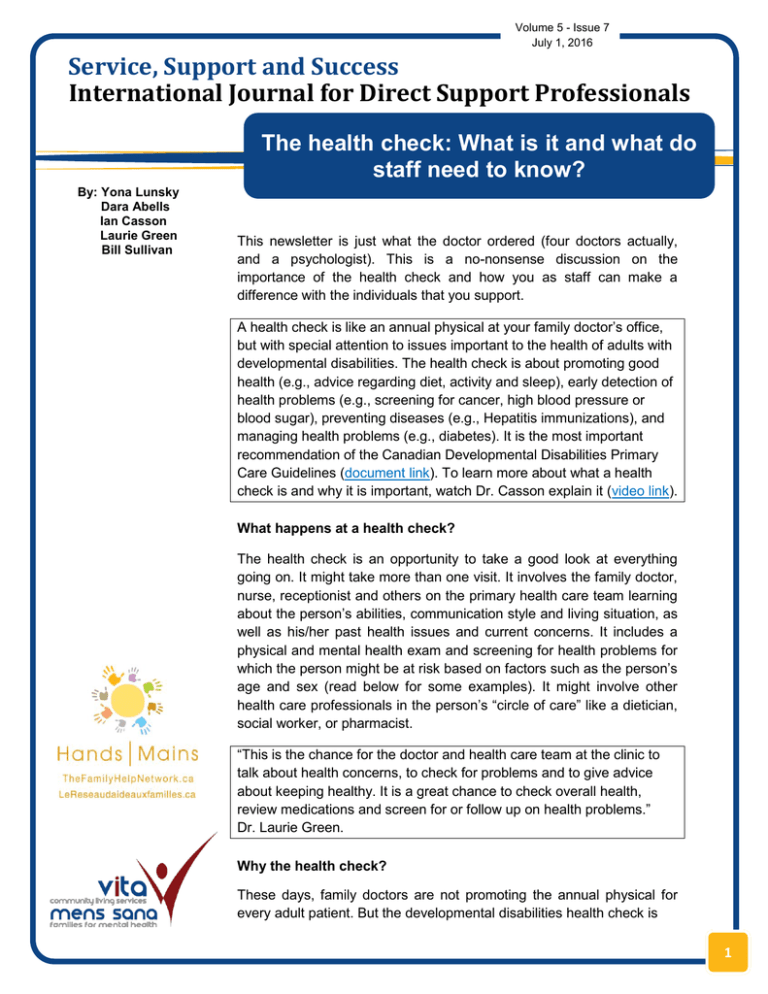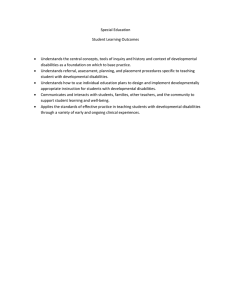Service, Support and Success International Journal for
advertisement

Volume 5 - Issue 7 July 1, 2016 Service, Support and Success International Journal for Direct Support Professionals The health check: What is it and what do staff need to know? By: Yona Lunsky Dara Abells Ian Casson Laurie Green Bill Sullivan This newsletter is just what the doctor ordered (four doctors actually, and a psychologist). This is a no-nonsense discussion on the importance of the health check and how you as staff can make a difference with the individuals that you support. A health check is like an annual physical at your family doctor’s office, but with special attention to issues important to the health of adults with developmental disabilities. The health check is about promoting good health (e.g., advice regarding diet, activity and sleep), early detection of health problems (e.g., screening for cancer, high blood pressure or blood sugar), preventing diseases (e.g., Hepatitis immunizations), and managing health problems (e.g., diabetes). It is the most important recommendation of the Canadian Developmental Disabilities Primary Care Guidelines (document link). To learn more about what a health check is and why it is important, watch Dr. Casson explain it (video link). What happens at a health check? The health check is an opportunity to take a good look at everything going on. It might take more than one visit. It involves the family doctor, nurse, receptionist and others on the primary health care team learning about the person’s abilities, communication style and living situation, as well as his/her past health issues and current concerns. It includes a physical and mental health exam and screening for health problems for which the person might be at risk based on factors such as the person’s age and sex (read below for some examples). It might involve other health care professionals in the person’s “circle of care” like a dietician, social worker, or pharmacist. “This is the chance for the doctor and health care team at the clinic to talk about health concerns, to check for problems and to give advice about keeping healthy. It is a great chance to check overall health, review medications and screen for or follow up on health problems.” Dr. Laurie Green. Why the health check? These days, family doctors are not promoting the annual physical for every adult patient. But the developmental disabilities health check is 1 Volume 5 - Issue 7 July 1, 2016 different and is important to do. We know that adults with developmental disabilities may not be as good at recognizing small problems when they start, and that they are at greater risk for a host of health issues. What can end up happening is that they visit the doctor for different things that are wrong, but they forget to see the doctor when things are right. This includes seeing the doctor for important screening and prevention, as well as health promotion. This situation means that we discover problems later than we should, which can be stressful and potentially dangerous for everyone. The family doctor’s office is sometimes described as the person’s medical home. One role of the family doctor is to bring everything together related to a person’s health. The annual health check is a good way for individuals with developmental disabilities to get to know and become more comfortable with their family doctor. If something is hurting or seems different than before, you want to see a doctor who knows the person you are supporting well. Having such a relationship helps the person with a developmental disability especially during visits when something is wrong, which can be stressful. Emergency doctors are great and so are all the specialists out there. But the family doctor is a different kind of specialist; they are a specialist at knowing their patients as people. Five reasons to do health checks: 1. Prevent getting sick e.g., immunizations 2. Catch problems early, e.g., check for high blood pressure and heart disease 3. Get helpful screening tests and referrals started, e.g., counselling, testing thyroid function, cancer screening, vision, hearing and dental health 4. Help everyone get more comfortable with each other and know more about health issues and the current situation 5. Connect with other health workers (like the dietician, pharmacist, social worker) and helpful services What are some of the areas focused on during the health check? The health check involves a head-to-toe review of possible problems for the individual with a developmental disability and includes discussing topics such as: Lifestyle: Diet and exercise are important for everyone. Adults with developmental disabilities may need extra education and help with planning and maintaining healthy levels of physical activity and eating habits. In some conditions, obesity is very common (e.g. Prader-Willi Syndrome or Down syndrome), and the health check can be an important time to focus on weight management. Otherwise, it can lead to many other illnesses like diabetes, high blood pressure, arthritis / back pain, sleep problems, and depression, just to name a few. You can help the person you support by encouraging them to participate in fun physically active activities and help them make healthy food choices. Your doctor and dietician can help with this. Another important lifestyle topic that will come up at the visit is substance use, like caffeine, alcohol, and illicit drugs. 2 Volume 5 - Issue 7 July 1, 2016 Skin conditions: The doctor will ask about any skin changes for the person with a developmental disability, another common concern that may be more significant in someone with a developmental disability. The doctor will check for any skin breakdown (or pressure sores) that can come from being in a wheelchair and watch for any signs of skin infection (e.g. redness, swelling, tenderness) that can be caused by poor hygiene, sweating, or skin cuts or scrapes. Dry or itchy skin can be very uncomfortable. Finally, a skin examination is very important to look for any changing or new moles that may be suggestive of a skin cancer. Vision, hearing, and dental care: We all know the importance of being able to see and hear the things and people around us. The health check is a good opportunity to make sure that the person you support is hearing and seeing properly, and referred for further assessments as necessary, so that they can also interact as best as possible in the world. Adults with developmental disabilities are more likely to have problems with vision and hearing than other adults, and they may not know how or when to tell us that they are developing problems. Someone who doesn’t listen might actually not be hearing what is said. And someone who doesn’t want to go places might be finding it hard to navigate safely if they can’t see as well as they used to. Regular dental care is also important. The family doctor will want to make sure this is happening. Unrecognized dental problems can lead to serious and painful infections. Breathing problems: Breathing problems like asthma are more common in those with developmental disabilities than those without. Obesity and being physically inactive can lead to breathing problems but problems breathing can also make it harder to get exercise and even just get around. It might be a short-term problem like a new allergy, but it might be more serious, like pneumonia or sleep apnea. Stomach problems: People with developmental disabilities may not be able to explain discomforts related to problems like heart burn or constipation, but these issues are more common in this population and might explain changes in somebody’s behaviour (to read more on this, read The Scoop on Poop newsletter). Another stomach problem is a bacterial infection called H. pylori which can cause ulcers. Doctors can order a blood test to check for this, if needed. To read more on this, see: The Scoop on Poop newsletter (Volume 4, Issue 7). Mental health: The doctor wants to know about mental health and not just physical health. Nearly one in two adults with developmental disabilities have mental health concerns. The doctor might ask questions about mood, energy, getting along with others, and any unusual behaviours. For more information on mental health, see the Let's Talk about Mental Health newsletter (Volume 5, Issue 2). Sexual health: Did you know that individuals with developmental disabilities are two to three times more likely to experience sexual abuse at some point during their lives than other people? There are also many individuals with developmental disabilities who are in romantic or sexual relationships who need to be educated regarding healthy, safe sex, including seeing their doctor to discuss important topics like contraception and pregnancy or to learn more about their periods, menstrual hygiene, and options they could consider if they are having menstrual issues like period pain. 3 Volume 5 - Issue 7 July 1, 2016 Screening for cancers: As we get older, all of us should be screened for different kinds of cancers. We know that this screening happens less often for people with developmental disabilities and that is not ok. The earlier cancer is identified, the better the outcome. Read the newsletters on men's health (Volume 2, Issue 9) and women's health (Volume 3, Issue 2) for more information. Bone health and risk for falls: We know that some people with developmental disabilities are at risk for falling and breaking their bones. Some of their medications, like their anti-seizure medications, along with limited walking can make their bones more fragile so they can break more easily and may be a reason that the individual needs to have their bone mineral density tested at an earlier age than the general population. Medication monitoring: People with developmental disabilities can be taking many medications. And while they can help, they can also have side effects which, left unchecked, can lead to more problems. It is very important to have regular check-ins about what the medications are being used for and how the different medications are working. For more information about medications, see the Medication, Education and Advocacy newsletter (Volume 3, Issue 5). Consent It is very important to know about who makes decisions in health care. Some decisions are harder to make than others. This means that the person you support might be able to make some decisions themselves, like agreeing to have their blood pressure taken, but not others, like agreeing to take a blood pressure medication which might put them at greater risk for falling. Consent is something to think about before the appointment but also something to talk about at the appointment. Who helps the person you support to make decisions? You want them to know that a health check is coming up and encourage them to attend the appointment. Remember that a person's ability to make decisions can change over time. If your family doctor thinks you can make decisions about the person you are supporting, be sure to remind them that you cannot. Just because you are the person’s main staff does not make you their “substitute decision maker,” which is the legal term for the person who can decide things on the patient’s behalf. Your job is to help empower the person you support to be part of the health check conversation. This means preparing them. Try sitting together and watching the video of Andrew where he tells us what to expect at a health check. Fill out a communication tool together, like the “Today's visit” form, talk about what might happen at the appointment, and plan together what information you want to share. Some final tips to help with the health check: Booking the appointment- your doctor might call you to book a health check, but if they don't call, you can call to set it up! Arrange the appointment for the start or end of day if it needs to be quieter (or at a time that is usually the person’s best time of day). 4 Volume 5 - Issue 7 July 1, 2016 Bring video or photos to show how things were before, if there has been a change, or to show a challenging situation or environment at home, to help the doctor get the full picture. Visuals can also help the person you support take the lead in explaining things. Bring a list of current medications, which you can get printed from the pharmacy. If some medications were prescribed or changed recently by a different doctor, it is possible that the family doctor might not have updated his or her list of medications to include these changes. Bring a favourite object or activity to the appointment, which can be used as a distraction, or activity while you wait, or even during the exam. Prepare the person you support about when the appointment is, what to expect, and practice what to talk about. If it is hard to do the health check in one visit, remember that you can always arrange to complete it in a series of shorter appointments. If the doctor’s office is not the best place to have an appointment, don’t be afraid to ask whether a home visit might be a possibility. Remember that old expression: A stitch in time saves nine? Or an ounce of prevention is worth a pound of cure? With good planning, a strong relationship, some flexibility and creativity, everyone’s health care can be managed well, and health checks can become the cornerstone of excellent “patient-centered” care in the field of developmental disabilities. Remember how much we can learn from each other. Tell us at hcardd@camh.ca about your successes, what you did, and what the doctor did to make things work well. If you are struggling, by starting this dialogue, you might be able to learn from others in similar situations about how they have improved health care. You can find lots of resources to help with primary care on the Surrey Place Centre’s website under Primary Care. If the person you support has a specific syndrome, like Down syndrome or Fragile X syndrome, there may be other health issues to watch for regularly. Your doctor and you can look at the appropriate Health Watch Tables found on this website for “syndrome specific” suggestions. About the authors: Yona Lunsky is a psychologist who directs the Health Care Access Research and Developmental Disabilities Program (H-CARDD) at CAMH in Toronto. Dara Abells is a family doctor from University of Toronto. Ian Casson is a family doctor from the Queen’s Family Health Team in Kingston, Ontario. Bill Sullivan and Laurie Green are family doctors from the St. Mikes Family Health Team in Toronto. Bill also directs the Developmental Disabilities Primary Care Program based out of Surrey Place Centre. 5 Volume 5 - Issue 7 July 1, 2016 Answers to FAQ’s about the newsletter 1) The newsletter is intended to be widely distributed; you do not need permission to forward. You do need permission to publish in a newsletter or magazine. 2) You may subscribe by sending an email to dhingsburger@vitacls.org 3) We are accepting submissions. Email article ideas to either the address above or to anethercott@handstfhn.ca 4) We welcome feedback on any of the articles that appear here. 6



